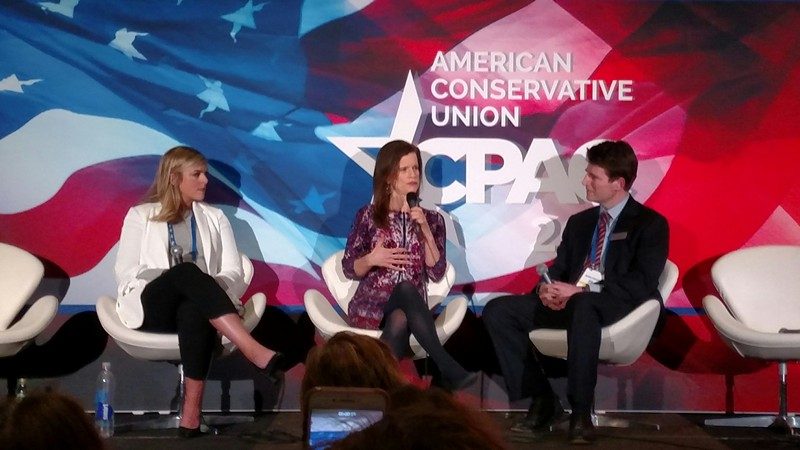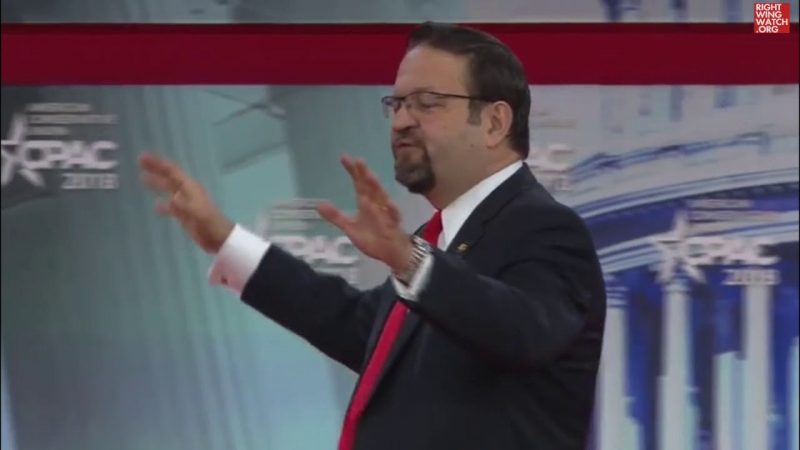A Thursday evening Conservative Political Action Conference panel on “The Future of the American Family” was moderated by Sean Fieler, one of the biggest funders of anti-LGBTQ-equality groups and campaigns in the country. Fieler is not a household name, but he and his money are well known on the Religious Right. Personally and through his foundation, he has spent millions funding an array of anti-abortion and anti-marriage-equality groups and campaigns.
Rick Harrison of the A&E reality show, “Pawn Stars,” was advertised as a panelist, but didn’t show, which left Fieler to interview The Heritage Foundation’s Jennifer Marshall and BlazeTV’s Allie Stuckey. Marshall is a Heritage vice president who leads its Institute for Family, Community, and Opportunity; in 2016, she criticized the Obama administration’s foreign policy support for reproductive choice and LGBT human rights. Marshall appeared in Rick Santorum’s 2014 movie, “One Generation Away: The Erosion of Religious Liberty.” At the 2010 Values Voter Summit, Marshall spoke of the need to call attention to the “moral bankruptcy” of the welfare state and the war on poverty.
On the CPAC panel, Marshall focused on problems she said have been caused by what she said was the break between marriage and the raising of children. She said that changes in the structure of society, from the social safety net to increased economic opportunities for women, have changed relational dynamics away from the previous near-universal presumption toward marriage. She called on churches to take the lead in rebuilding a culture of marriage by mentoring young couples who may not have grown up with a good model of stable marriage relationships.
Marshall said anti-poverty efforts need to focus more on marriage, saying that the structure of the welfare system has harmfully disincentivized women from getting married, and that a child raised outside of marriage is five times more likely to experience poverty. She made a point that Heritage has long argued—that small-government conservatives should care more about the family, which is where you get responsible citizens from.
Stuckey focused on the problem of “hyperindividualism” and said conservatives need to push people toward “biblical morality.” She said the search for truth “within ourselves” invariably comes up short, leading to “lost” people that end up seeking solace in identity politics and a love for collectivism. She bemoaned that so many Millennials are “shifting toward progressivism” that doesn’t require people to “make moral changes in our lives.”
“Man’s first sin was passivity,” she said, seemingly referring to Adam in the Garden of Eden somehow having allowed Eve to get out of line. She said our society has created “a generation of passive men” who are unwilling to take responsibility for their actions, and one consequence has been that the “push toward abortion and infanticide” has been fed by the feminist idea that women should have the same right to walk away from babies that a man has.
Stuckey said it’s a problem that cultural icons like the Kardashians have children outside of marriage, which helps explain why young people are less likely to see having children out of wedlock as immoral or harmful. Stuckey said it’s important for the conservative movement to steer people toward “biblical morality” and a “biblical definition of what makes a fulfilling relationship.”
God is the one who designed marriage and said, “This is what it’s going to look like,” Stuckey said. While she said that Jordan Peterson makes good secular arguments for the benefits of marriage, she argued that right-wing activists should be “huge proponents” of absolute truth, morality, and God.
She said some libertarians think they can make common ground with people by letting go of social issues. “Unfortunately you have a lot of conservatives” who think “you can make the case for small government without the case for God and morality and family,” she said, “And you just can’t.”
Fieler asked about the impact of the Supreme Court’s 2015 marriage-equality decision in Obergefell. Marshall responded that it furthered the disconnection between marriage and child-bearing that marked the last half century. She said the decision has led to challenges to freedom of speech, freedom of association and religious freedom. “Those are challenges that come home to the family,” she said. Marshall said that gender identity issues are threatening parents’ freedom to raise their children with clarity.
Stuckey said she’s concerned about all the effort that goes into ensuring that couples who cannot physically procreate can have children with their own DNA, saying she is troubled by the impact that such “engineering” and surrogacy have on adoption. Regarding the “redefinition of the family,” Stuckey said she’s not sure if we’ve lived long enough to know about the fate of children “who are raised in those kinds of homes.”
Fieler expressed concern about young people who are in “government schools” and exposed to media that is “on board with the gay agenda.” Marshall used the question to promote greater “parental choice” in education so that parents can send their kids to schools that reflect their values. Stuckey said that whatever schools children attend, their parents have the responsibility to teach them values, such as an appreciation for patriotism and capitalism.
As for the future, Stuckey took heart in the fact that religious people are having more children than non-religious people. “A lot of people say well, religion’s dying out, secularism is going to win. Well, y’all ain’t having the kids, we are,” she said, which she said is grounded in religious people’s desire to fulfill God’s mandate to multiply and fill the earth, and a biblical understanding of the joy to be found in the sacrifice and selflessness required of parents.
In the end, she said, conservatives should call people into the church and to the “importance of knowing God and believing in God” and the gospel of Jesus Christ, which she said has the power to change hearts, minds, and communities.
Here’s a bit more background on Fieler:
In 2014, Rewire reported that Fieler had personally given $18 million to anti-choice and anti-LGBTQ political candidates and causes since 2010. Fieler himself gave more than $1 million to anti-marriage-equality groups and was the “single largest donor” to an effort to put California’s transgender students’ rights law on the ballot in 2013. In 2017, Fieler was among the biggest donors to notoriously anti-LGBTQ Virginia legislator Bob Marshall, who was defeated by Danica Roem, who became the first openly transgender state legislator.
Fieler also kicked in $10,000 to Restore Our Godly Heritage PAC in a last-minute effort to salvage the sinking Senate campaign of former Alabama Chief Justice Roy Moore. Fieler funds and chairs the American Principles Project, which was designed to push Republicans to the right on social issues, and he gives to the American Principles Fund super PAC, which delivers money to right-wing governors and state Republican parties.
He is also a trustee of the Witherspoon Institute and a board member of Becket, a legal group active in promoting the Religious Right’s weaponized interpretation of religious liberty. He has been a major funder of Mark Regnerus, whose infamous “New Family Structures Study” has been widely debunked but which is still cited by critics of marriage equality and opponents of parenting by same-sex couples.
Fieler’s foundation has also supported C-FAM, which opposes protections for LGBTQ human rights at the United Nations. In 2012, William Kristol introduced Fieler at an APP event, calling him “someone who I think will play an increasing role in our public life, should play an increasing role in our public life, over the next years and decades.” In 2015, Fieler wrote an op ed for Newsweek arguing that the transgender movement had moved too far too fast; this “political overreach,” he wrote, “puts the underlying principle of the entire LGBT movement at risk,” and he encouraged Republicans to push back hard.
Last year the APP was among the anti-choice and anti-LGBTQ groups pushing or Trump to nominate Any Coney Barrett to the Supreme Court.









